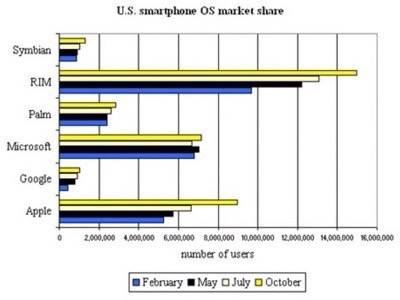The latest quarterly survey by comScore reports that the iPhone just passed Windows Mobile phones in US market share, though it remains at just over half the level of the Blackberry.

The iPhone has been outselling Windows Mobile for some time, so it was only a matter of time until there were more iPhones in peoples’ hands. Android is still at the back of the pack but is showing signs of significant momentum.
Tracing links back from blog to blog the comScore phone survey of users about what types of phones they have in their hands appears first on FierceDeveloper; comScore’s press contact was unavailable for comment but mobile developers say the numbers are unsurprising.
Android growth has been steady but that platform remains below Windows Mobile, Palm’s WebOS and Symbian. Another report by comScore this morning though found that consumer interest in Android is growing fast and now rivals consumer interest in the iPhone.

“Of those American consumers in the market for a smartphone,” comScore writes, “17 percent are considering the purchase of an android-supported device in next three months, compared to 20 percent indicating they plan to purchase an iPhone.
Android’s prospects may fare even better in the global marketplace.
“Android will continue to pick up market share, especially in the global smartphone market, because of Symbian’s lack of innovation in the last 3-4 years,” mobile blogger Jason Harris told us today. “Symbian is said to have 37% worldwide market share, and this will further erode as more folks give Android a look. Especially with the Nexus One coming out – a phone that is sold directly from Google and not from your carrier – that’s very cohesive with the European model. Right now Android has only been available from carriers, leading to OS fragmentation. Now with the Nexus One, the phone will come from Google itself, meaning your OS updates will be direct from the source, not via the carrier, who has customized the Android OS to their liking. That might work in the US, where we are carrier-centric, but not in other markets, especially emerging markets.”

















